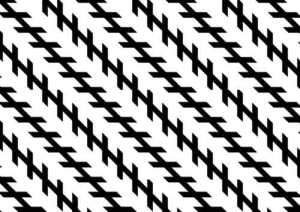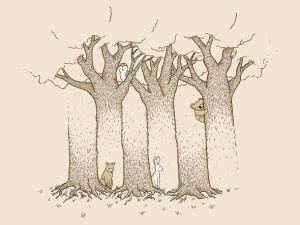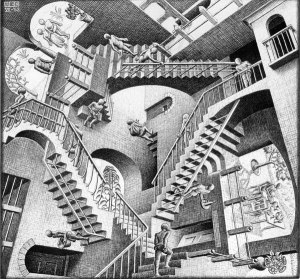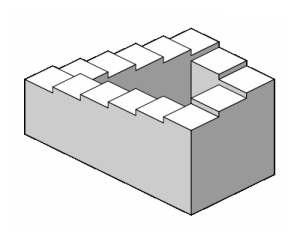While reading Zettl’s explanations of how we perceive space in a two-dimensional space, I was immediately draw to the idea of optical illusions. As children, most of us have at one point or another been mesmerized by the whirling spirals of ink, mystery dots, and two-faced men that play on our inherent visual tendencies.
This picture, known as the Zöllner Illusion, shows diagonal lines that appear to be at different angles crossing across the page. However, the diagonal lines themselves are all at the same angle. The distortion is caused by the shorter lines that intersect with the main ones (they remind me of railroad tracks) and give the impression that the main diagonal is slanting in the direction of the shorter lines. This illusion operates under the same principle at Zettl’s example involving diagonal perspective in pictures of hills. Motion tends to follow the direction of the diagonal. Thus here, the parallels between the shorter lines give the impression that the longer lines are slanted.
This image, known as a Blivet or Devil’s fork, has taken many different forms, varying from a simple tuning fork to an elephant with a debatable number of legs. In essence, a Blivet is something that doesn’t work, a glitch. This image is a “glitchy” image- the treetops and tree stumps do not line up. Zettl explains how we try to complete images and make them fit with our expectations by extending what already exists in the image. Here, at first glance we assume that there are three trees that are shaded at the top and bottom, but upon closer examination, there are three tree tops and three tree stumps but they do not fit together. Adding to the conundrum are the animals interspersed amidst the “trees”, taking up space that our initial perceptions tell us is filled.
Finally, to play on the idea of vectors as brought up in Zettl, I give you M.C. Escher’s “Relativity”, and the paradoxical drawing it later inspired, the Penrose Stairs.
These images go against much of what our mind expect to see, based on the concept of vectors, thus both intriguing and frustrating humanity to no end.



